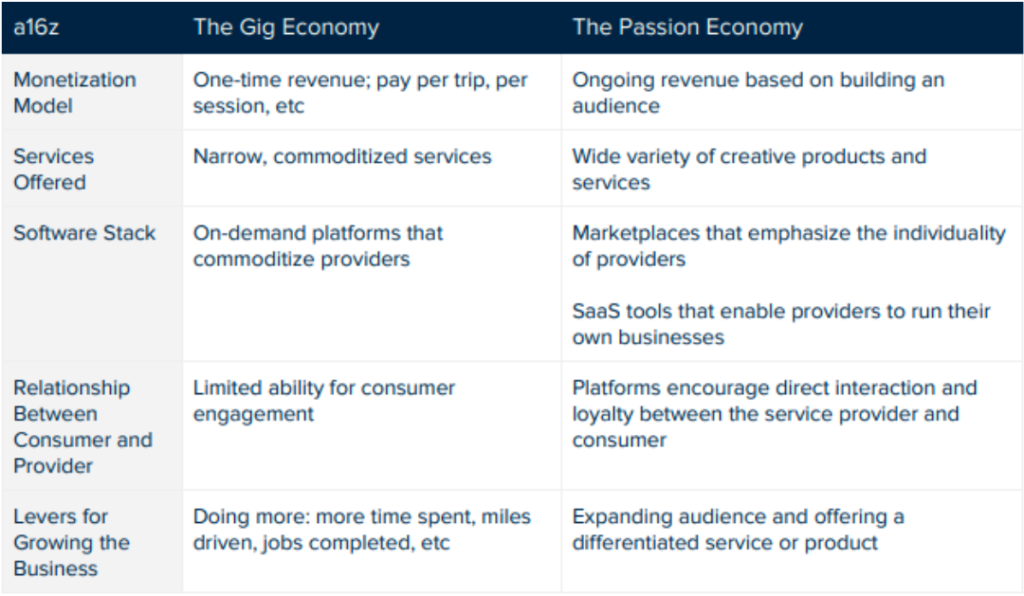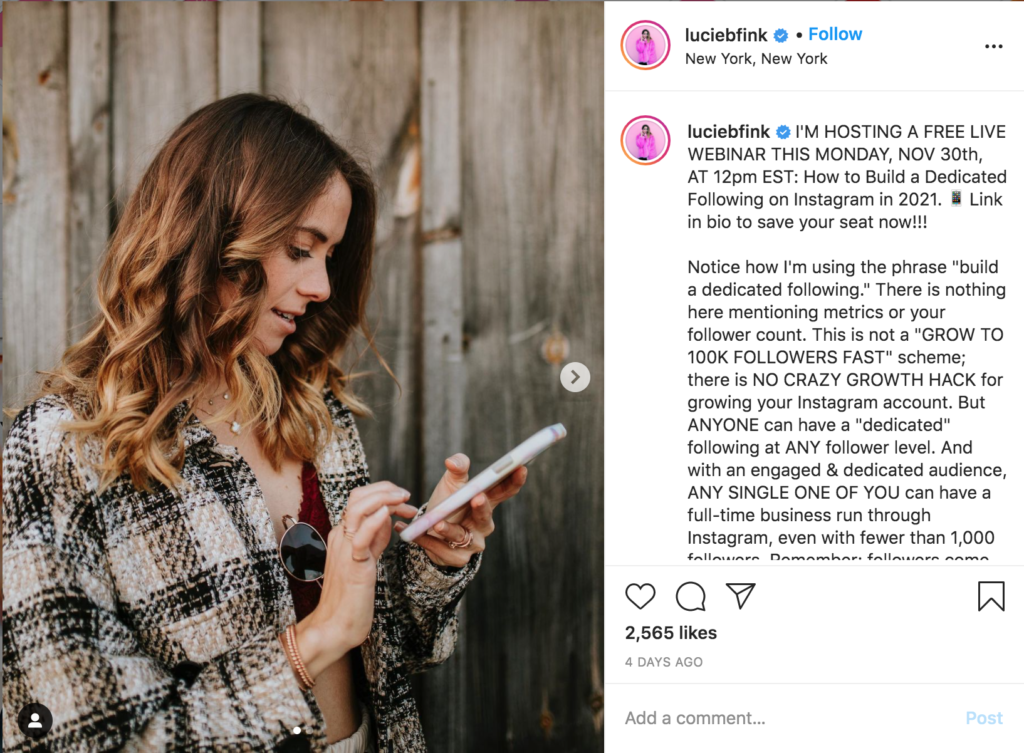Table of Contents
In the last decade or longer, America has established a booming “gig” economy. Characterized by “boss babes” and “side hustlers,” society’s needs have created an on-demand marketplace, resulting in an environment that encourages innovative ways to make a dollar. In the early stages of this concept, the gig economy was sometimes referred to as the freelance economy, agile workforce or even temporary work. Today, some estimate that a third of the working population is working in a gig capacity because somewhere down the line, “gigging” turned into something more than just a way to pick up a little extra cash. It became about passion, and the passion economy was born
Gigging turned Greater
The biggest benefit of the gig economy is the flexibility and efficiency these jobs bring. Attributed to the appeal of self-employment, workers realized that in this space, monetizing time in specific and narrow services can pay off.
Some of the best gig economy jobs encompass a variety of fields, industries and skills to include some of the household names:
- Postmates
- Uber
- Instacart
- DoorDash
- Airbnb
For services that attract timeliness and consistency like food delivery, parking, or transportation, success comes by doing more. More time, more miles and more jobs completed mean more money in your pocket. Bridging that gap between doing more and doing what you love is where the passion economy comes in. Especially in the modern digital world where it has become increasingly more common for people to work remotely from home.
As Li Jin stated in The Passion Economy and the Future of Work, “Gig work isn’t going anywhere—but there are now more ways to capitalize on creativity. Users can now build audiences at scale and turn their passions into livelihoods, whether that’s playing video games or producing video content.”
Capitalizing on Creativity
Shifting this “more” mindset of the gig economy into more of a passion-project-turned paycheck mentality has huge implications on the future of entrepreneurship and the future of the workforce. The passion economy, which encompasses all creators who generate revenue by producing original content based on their individuality, presents a new way to take advantage of creativity and interested communities.
The passion economy is a transformed and evolved version of the gig economy, with the key difference in the emphasis on the individuality and creativity of people on both sides of the equation.
Per Inspired Global Capital // Passion Economy Whitepaper
Defining Passion
The essence of the passion economy lies in connecting creators with genuine, engaged communities who share their passion. Unlike the gig economy, passion-based work doesn’t involve going to a platform to obtain a job solely for income and convenience. This concept draws creators to fitting platforms that help fuel this passion and provide the flexibility to build a brand from it.
Just four years ago in 2016, 14.6 US creators earned $5.8 billion across 9 key platforms:
- Amazon Publishing
- eBay
- Etsy
- Shapeways
- Tumblr
- Twitch
- WordPress
- Youtube
Today, this space is growing at a rapid pace due to a variety of reasons including the rise of TikTok, the growth of social media users, up-and-coming companies introducing tools to help influencers monetize, and more. The growth of the passion economy can be seen just in the accessibility and acceptance of this work as a career path. Over half of Americans in 2020 (54%) aged 13 to 38 say they would become an influencer if given the chance.
This desire, coupled with the shift towards digital events and the projection of the influencer marketing industry to reach between $5 and $15 billion by 2022, influencers who can find the right balance of working hard and playing hard reap some major benefits.
Looking to run an epic influencer marketing campaign? NeoReach has the best experience in creating viral campaigns that convert on social media. Sign up here!
Remaining Relevant & Building Brands
Passion economy fuels a new model of internet-powered entrepreneurship. A major trend that works alongside the passion economy is that consumers prefer organic content and influencer content over traditional strategy. Today’s social media users crave personal connection and reliability.
Of all the occupants in this space, including the likes of companies like Patreon, Facebook & Instagram Creator Studio, Etsy, Shopify and more, influencers have found the success comes in taking advantage of the tools that exist to help them build up their personal brand. These companies and others allow influencers to gain a following and make a profit by using these strategies:
- Selling subscriptions
- Providing performance insights and analytics
- Offering exclusive memberships
- Promoting shoppable posts and links
- Matching influencers with like-minded companies
- Creating digital marketplaces and online stores
Influencers at any level (from micro-influencers to celebrities) have a big opportunity as of today if they use their resources. In fact, Rhian Mason of Mango Communications suggests the change in the value system of influencer marketing has eliminated the tiered and layered approach based on reach and scale, and that potential revenue and influence is dependent on the access they have to their community and their ability to connect.
With the recent surge in new platforms such as OnlyFans, Cameo, and the rapid adoption of e-commerce tools, even the strategies listed above won’t be enough to stay relevant for long. Engagement is as important as ever and in light of COVID, Black Lives Matter, the global climate crisis, and everything else, consumers seek substance over superficial voices. With these heightened expectations for influencers who seek to stay in this passion economy, the question becomes how big the passion economy will become and how to innovate and adapt in order to make a profit off passion.
Monetizing Passion
Influencers have become dynamic, multi-faceted content partners, allowing brands to access broader communities, driving credibility, and directly connecting to products and brands. So, how do people in the passion economy serve a social media demographic that demands instantaneous, fresh, and genuine content? Or better yet, how do influencers make money?
1. Platforms are accessible to everyone
-
- The ability to make a living off creative skills has trickled down to individuals at scale, helping everyday people to launch and grow businesses by building websites, tracking analytics and more. These tools take the business beyond just a gig, expanding beyond businesses & established professionals.
2. Engagement
-
-
- The most important metric in the valuation and profit potential of an influencer is their ability to maintain an engagement, not just a following count. A certain level of engagement makes an influencer infinitely valuable to a brand, and this two-sided model is what drives the supply and demand of the passion economy.
- Example: Medium – which is a platform that charges readers a subscription to access stories and the money made by a writer is proportionate to the amount of time readers spend engaging with their stories.
-
3. Creativity
-
- Whereas previous gig economy marketplaces were built strictly for standardized, pay-for-service jobs, social platforms are able to highlight variation among workers in categories that can benefit from more diversity in user choice.
4. Digital-focused platforms
-
- Social platforms and other companies in this space are beginning to fit the mold of the passion economy, creating tools to adhere to what influencers need in order to make a profit
- Examples of influencer-focused services: Superpeer, Moe, Soona, Influence.co, etc.
5. Inspiration through innovation
-
- So many influencers are able to tap into new revenue opportunities by building up their following. Connecting with the community is complementary to the new tools that are available to help with distribution—providing tools for marketing, managing customer relationships, and attribution.
More than a Side Hustle: Looking ahead
As mentioned already, more and more Millennials are taking matters into their own hands, fulfilling their desire to go beyond content creation and pursue their passions beyond social media. In order to keep their community engaged and spending, many influencers may veer away from sponsored posts and brand partnerships – taking the leap to start their own business or product line.
That said, brands should take advantage of the opportunity to form partnerships now while the passion economy is still very much reliant on sponsorships and paid posts. Whether it’s fashion, beauty, or health-focused, multiple influencers and brands have taken off and gained the attention of consumers across the globe.
Empowered by entrepreneurship, almost anyone can build audiences at scale and turn their passions into livelihoods. Gig economy was quickly overshadowed by the passion economy and there’s no sign of stopping now. Li Jin and other professionals envision a future in which the value of unique skills and knowledge can be unlocked, augmented, and surfaced to consumers – and the success that we result in is yet to be discovered.

























